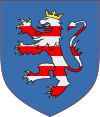Waldemar the Vexer (Merveilles des Morte)
| Waldemar the Vexer | |
|---|---|
 Portrait by Johann Wertinger, 1517 | |
| Born |
5 September 1492 Erfurt, Thuringia, Holy Roman Empire |
| Died |
30 June 1522 Hof, Bayreuth, Holy Roman Empire |
| House | House of Jenagotha |
| Father | Thin White Duke |
| Mother | Wilhelmine Přemysl |
| Religion |
Jungism (1508-) |
Waldemar the Vexer (5 September 1492 - 30 June 1522) was a Thuringian nobleman and diplomat, and a son of the Thin White Duke of Thuringia. He was the seventh child via the Duke's marriage to Wilhelmine Přemysl, daughter of Henry VIII, Holy Roman Emperor, and his eighth eldest surviving son overall. Waldemar was born in the generation following the Lenzburg-Premsylid War, but just before the Henrician Civil War, at a time when his homeland was especially devastated by conflict. As a result Waldemar received a disjointed education, with a mix of combat and oratorical skills.
Becoming of age around the time of the Protestant Reformation, Waldemar positioned himself as an ambassador to the newly created Jungist states in the region. After the Wolfen War he served as ambassador to Meissen and the Bishopric at Dresden, where he befriended figures such as Gustav Jung. Following the death of the Thin White Duke and the claimed succession of Waldemar's older half-brother Hugh the Heir, Waldemar became a constant annoyance to the new government. During the brief conflict between Hugh and Henry IX, Holy Roman Emperor, Waldemar strongly supported Henry's claim. He would deliver numerous speeches to the Thuringian government denouncing Hugh's character, calling him a jingoist and an opportunist. Nonetheless, the war ended in a victory for Hugh and confirmation of his rule as Duke of Thuringia, and Waldemar chose to flee. Arrested near the city of Hof while trying to flee across the border into Bohemia, Hugh had Waldemar quietly executed in order to remove any threats to his power, sending a startling message to the rest of the Jenagothas.

